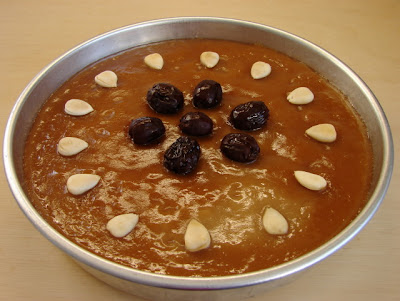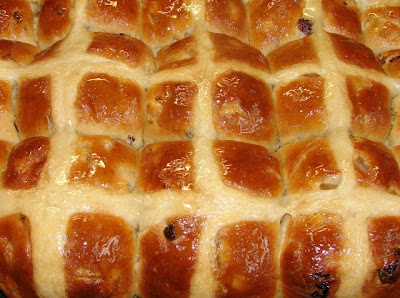New Year Rice Cake 年糕
Rice cake or nian gao 年糕 is something nearly every Chinese family will have for CNY. The two words 年 nian and 糕 gao rhyme with the Chinese greeting phrase 年年高升 nian nian gao sheng, literally translated as higher year after year or simply you will prosper year after year. So eating nian gao is considered lucky for the coming year.There are different nian gao, the Northerners have white plain rice cake made with plain rice (see this post), similar to Korean rice cake and normally cook with other things to make a savoury dish or rice cake soup.The Southerners like Cantonese have sweet sticky cakes made with glutinous rice flour. There is a little story about why these sticky sweet cakes are made. Any Chinese (Taoists) with praying Gods at home will know this. On the 12th lunar month and 24th day which was the 7th Feb in 2010, the Kitchen God/Stove Master (Zao Jun 灶君) will leave Earth to Heaven (I wondered if Zao Jun needs Scottie to beam him up :)). He is to report to the Heavenly Grandfather (天公 Tian Gong) or more commonly referred to as the Jade Emperor (玉皇大帝 Yu Huang Dadi), the activities of every family on earth making note of who has been good or who's naughty (sounds a bit like Christmas and Santa, doesn't it?). Good people will be blessed and anyone with a bad report will be punished for the coming year. In order to sweeten him up and shut his mouth, people have being making these sweet and sticky cakes (or other sweet cakes) as offerings for centuries. So you will find nian gao on every Zao Jun's praying table/ praying area in many Taoist Chinese homes from the 24th day /12th lunar month for at least a week till Zao Jun's coming back to Earth on the 30th which is New Year's Eve. In order to welcome Zao Jun back to earth with good news and blessings, every family will be busy cleaning the house and making all sorts of sweet cakes and biscuits, to start a new year.If you go to Chinatown or any Chinese grocery stores you will see many different nian gao at this time of the year. Some are made with a mould (mold) to look like a golden carp/fish, usually white with golden red. Fish is a symbolism for abundance and the colour golden red is lucky and also symbolises wealth (gold). The other more common nian gao is made with a simple cake mould like this I have made.
 This cake is very chewy and sticky when fresh (within a day or two after making) and after that it will become firmer and harder. So you can eat it while it is still chewy and sticky or firm and hard later. Once the cake gets harden, re-steaming or frying in slices will soften the cake. There isn't a lot of taste to this cake, there are people who don't like it at all. I am one who love it a lot. I like it especially when it has gotten hard, sliced and dipped in beaten egg and then fry till golden. Delicious.My mum used to ground buckets of soaked glutinous rice herself with an old fashioned stone grinder every year. Then made around 20 - 30 cakes, steamed them overnight or at least 8 - 10 hours. These cakes were for the family and relatives as gifts. Those were the happy time.Now I just buy glutinous rice flour. Not as good flavour as with freshly ground rice though, but that will do for me. My mum's recipe always with plain white sugar, the long hours of steaming will caramelise the sugar and make the cakes reddish brown.Here is a short cut recipe. The sugar is caramelised first before adding to the cake mixture, this will shorten the cooking time. This nian gao will freeze very well, so I normally make a few and keep some in the freezer for many months supply.Hung Tang Nian Gao 紅糖年糕 (caramelised sticky rice cake)This recipe is for one cake only, use any cake tin without a loose bottom or a pyrex dish or any container that will hold around 1.25 litres or 2 small 600ml disposable aluminium tins (takeaway containers). The total cake mix is around 1 litre.Ingredients:250g sugar + 1/4 cup water + 1 cup or 250ml water (this is to make the caramel)500g glutinous rice flour200 - 250ml water (more water, softer the cake)50g sugar2 tbsp cooking oila little oil for greasing the tin/pan/dishTo dec the cake (optional)few soaked Chinese red dates or jujube datessome skinned almonds. I used Chinese South Almonds 南杏仁, they are prettier than std almonds IMO.Method:
This cake is very chewy and sticky when fresh (within a day or two after making) and after that it will become firmer and harder. So you can eat it while it is still chewy and sticky or firm and hard later. Once the cake gets harden, re-steaming or frying in slices will soften the cake. There isn't a lot of taste to this cake, there are people who don't like it at all. I am one who love it a lot. I like it especially when it has gotten hard, sliced and dipped in beaten egg and then fry till golden. Delicious.My mum used to ground buckets of soaked glutinous rice herself with an old fashioned stone grinder every year. Then made around 20 - 30 cakes, steamed them overnight or at least 8 - 10 hours. These cakes were for the family and relatives as gifts. Those were the happy time.Now I just buy glutinous rice flour. Not as good flavour as with freshly ground rice though, but that will do for me. My mum's recipe always with plain white sugar, the long hours of steaming will caramelise the sugar and make the cakes reddish brown.Here is a short cut recipe. The sugar is caramelised first before adding to the cake mixture, this will shorten the cooking time. This nian gao will freeze very well, so I normally make a few and keep some in the freezer for many months supply.Hung Tang Nian Gao 紅糖年糕 (caramelised sticky rice cake)This recipe is for one cake only, use any cake tin without a loose bottom or a pyrex dish or any container that will hold around 1.25 litres or 2 small 600ml disposable aluminium tins (takeaway containers). The total cake mix is around 1 litre.Ingredients:250g sugar + 1/4 cup water + 1 cup or 250ml water (this is to make the caramel)500g glutinous rice flour200 - 250ml water (more water, softer the cake)50g sugar2 tbsp cooking oila little oil for greasing the tin/pan/dishTo dec the cake (optional)few soaked Chinese red dates or jujube datessome skinned almonds. I used Chinese South Almonds 南杏仁, they are prettier than std almonds IMO.Method:Put the 250g sugar with 1/4 cup water in small sauce pan, heat at medium heat till sugar dissolves (shake the pan slowly), till you get a clear syrup. Continue cooking till the sugar syrup bubbling up rapidly. When the syrup started to change colour turn the heat right down and continue heating till it has become light reddish brown, heat off. Any more heat the caramel will be too dark and burnt and it will taste bitter. Let this cool for about 1 minute then gradually pour in the 250ml water little by little. Be careful the first few drops of water hitting the hot caramel will make it boil rapidly. When the boiling subsides, pour in the rest of the water in one go. If some of the caramel did not dissolve, put the heat back on stir till dissolved. Let this cool for a while.
Put the glutinous flour, caramel, the next 200 - 250ml water, sugar and oil together in a mixing bowl. Mix well with a wooden spoon till no lumps. Let this mixture sit for about 1 - 2 hours if you have the time, this will improve the texture and flavour slightly. If you are in a hurry can steam right away.
Grease the tin/dish with oil. Stir the mixture and pour into the tin/dish.
Steam for 2 - 3 hours. The longer you steam the darker the colour of the cake. Once the cake is ready, put on some dates and almonds for decoration. Push the dates into the sticky cake so they will stick firmly.
Alternate method is to pressure cook the cake this will save you time and fuel. Put a rack in the pressure cooker and add about 4 cm deep of water and put the cake on the rack. Pressure cook (steam) for about 1 hour 15 minutes, turn the heat to low once steam is coming out of the cooker's steam vent. Pressure cooking will caramelise the cake very quickly. The downside with pressure cooking is the cake can boil and bubble up so make sure the cake tin you use has plenty of room for expansion. The rising cake will subside and you will end up having a cake with an ugly/uneven surface like this picture below.
Once the cake is cooked leave to cool then put in the fridge or somewhere cold overnight or longer to let it firm up a bit before trying to get it out of the tin/ container. It' s very sticky when fresh, will stick very firmly to the cake tin/container. Once harden up a bit it's much easier to take out. If it sticks very firmly, ease the edge with a spatula and pull the cake out with a bit of force. Do worry you will not damage the cake much.

Source



Comments
Post a Comment